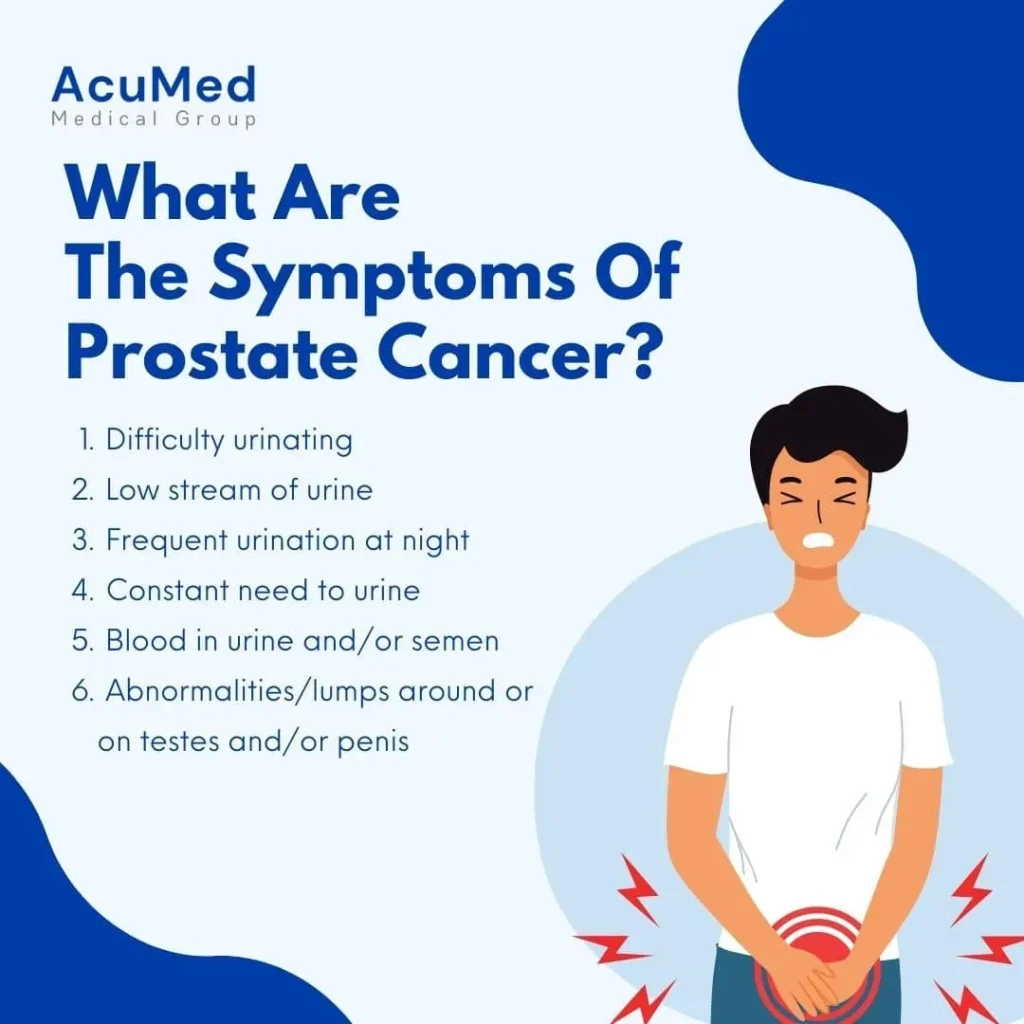Prostate cancer symptoms can be subtle yet significant, often urging men to seek medical attention sooner rather than later. Common indicators include painful urination, changes in urination patterns, or even unusual discharges, such as blood in the ejaculate. It’s crucial not to dismiss these signs, as they could hint at serious health issues, including prostate cancer. With the rising importance of men’s health awareness, early detection of prostate cancer through regular PSA testing is vital for improving outcomes. Understanding prostate cancer risk factors and recognizing abnormal ejaculate symptoms can empower men to take control of their health and encourage timely intervention.
When it comes to understanding the signs of prostate malignancies, recognizing prostate-related health issues is essential. Symptoms of prostate cancer can manifest in various ways, often starting with difficulties in urinating or discomfort in the pelvic region. Many men might overlook these warning signs, yet they are critical for early diagnosis and potential recovery. Proactive health measures, including assessing malignancy risk factors, are increasingly vital in today’s health landscape. By being aware of these early symptoms, men can prioritize their health and make informed decisions regarding medical evaluations.
Understanding Prostate Cancer Symptoms
Prostate cancer symptoms can be subtle and often mistaken for benign issues, especially in younger men. Common signs include frequent urination, discomfort in the pelvic area, and changes in urinary habits. A less talked about symptom, as experienced by Tim Weale, is the presence of blood in the ejaculate, which can be alarming and should never be ignored. Recognizing these symptoms early is crucial for timely diagnosis and intervention.
Additionally, other prostate cancer symptoms may include pain in the lower back, hips, or thighs. These discomforts can easily be attributed to other causes, often leading men to delay seeking medical advice. The psychological burden of discussing such intimate symptoms can deter many from reaching out, but awareness is key. Men must understand that acknowledging these signs can lead to early detection and significantly improve treatment outcomes.
The Importance of Early Detection in Prostate Cancer
Early detection of prostate cancer is fundamentally important in increasing survival rates. Regular check-ups and knowing one’s baseline PSA levels allow for efficient monitoring of prostate health. By identifying elevated PSA results early, men can pursue further testing and preventive measures, which could make all the difference in their treatment path. Tim Weale’s journey underscores this necessity; initial abnormal symptoms led to early testing, ultimately guiding his treatment in time.
Moreover, awareness campaigns highlighting the significance of early detection can foster proactive health practices among men. They can encourage regular screenings, particularly in high-risk individuals, who may face prostate cancer due to genetic factors or previous inflammatory conditions. Highlighting success stories can motivate others to act promptly on their symptoms, so men are less likely to overlook potential warning signs.
The Role of PSA Testing in Prostate Health
PSA testing plays a critical role in assessing prostate health, especially for men over the age of 40 or those with a family history of prostate cancer. It serves as a screening tool to detect potential problems in the prostate long before symptoms appear. Tim Weale’s alarming PSA levels were pivotal in his diagnosis, reaffirming the test’s importance in identifying the disease early. Regular PSA testing should be a part of every man’s health strategy as part of routine check-ups.
Furthermore, discussions surrounding the necessity and frequency of PSA testing are becoming increasingly vital in men’s health circles. While some may fear unnecessary treatments triggered by false positives, the knowledge gained from these tests often outweighs the risks. Men should engage in conversations with their healthcare providers about the pros and cons of PSA testing, aligning it with their personal health needs and family history.
Men’s Health Awareness and Prostate Cancer
Men’s health awareness is crucial in combating illnesses like prostate cancer, which has become alarmingly common. Many men, like Tim Weale, often neglect their health until serious problems arise. Increasing awareness about prostate cancer and its symptoms can empower men to prioritize their health and seek medical advice promptly. Educational initiatives can highlight how awareness can lead to early diagnosis and, ultimately, better outcomes.
Moreover, fostering an environment where men feel comfortable discussing health concerns, including sexual health, can lead to higher rates of diagnosis and treatment. Proactive engagement in men’s health can also reduce stigma, prompting discussions around sensitive topics like abnormal ejaculation and other symptoms that might be indicative of prostate issues.
Understanding Prostate Cancer Risk Factors
Understanding the risk factors associated with prostate cancer is vital for prevention and early detection. Age, family history, and genetic predispositions are leading contributors to an individual’s likelihood of developing the disease. Men over 50, particularly those with a direct family history of prostate cancer, should be especially vigilant about screenings and symptoms, as they are at a higher risk.
In addition to hereditary factors, lifestyle choices can also affect prostate cancer risk. Diet, physical activity, and overall health significantly contribute to one’s risk profile. An awareness of these risk factors can encourage men to adopt healthier lifestyles, which could, in turn, lower the incidence of prostate cancer in populations at risk.
Addressing Abnormal Ejaculate Symptoms
Abnormal ejaculate symptoms can be a significant indicator of underlying health issues, including prostate cancer. Tim Weale’s experience of noticing blood in his ejaculate is a prime example of how this symptom is often overshadowed by embarrassment or stigma. It is crucial for men to understand that such abnormalities warrant immediate medical attention, as they can be among the first signs of prostate complications.
It is important for men to break the silence around symptoms like blood in the ejaculate. Open discussions with healthcare providers can demystify these issues, facilitating early diagnosis and effective treatment strategies. Recognizing and responding to such symptoms can enhance overall health outcomes and potentially save lives, stressing that no symptom should be considered too private or embarrassing to discuss.
Promoting Regular Health Check-Ups for Men
Regular health check-ups are essential for men, particularly as they age. These visits provide opportunities not just for PSA testing but also for a full assessment of overall health, including prostate health. Establishing a rapport with healthcare professionals encourages men to voice their health concerns openly, leading to earlier detection of potential issues.
Incorporating routine screenings into men’s health guidelines can help catch prostate cancer indicators early, allowing for timely intervention. As Tim Weale’s story illustrates, remaining vigilant through regular check-ups and screenings can make a profound difference in health outcomes.
Impact of Prostate Cancer on Mental Health
The impact of prostate cancer extends beyond physical health, significantly affecting men’s mental and emotional well-being. The shock of a diagnosis, coupled with the challenges of treatment, can lead to stress, anxiety, and depression. Many men may feel isolated or struggle to communicate their feelings, making support networks vital for coping with the emotional burden of cancer.
Encouraging discussions about mental health within the context of prostate cancer is crucial in providing holistic care. Mental health resources, including counseling and support groups, can help men navigate their journey post-diagnosis, emphasizing that seeking help is a sign of strength and not a weakness. Sharing experiences can foster resilience, reminding men that they are not alone in their battle.
Lifestyle Modifications to Reduce Prostate Cancer Risk
Making lifestyle modifications can significantly reduce the risk of developing prostate cancer. Adequate nutrition, regular physical activity, and maintaining a healthy weight are critical factors influencing prostate health. Men can also benefit from a diet rich in fruits, vegetables, and healthy fats, which have been associated with lower prostate cancer risks.
In addition to dietary changes, lifestyle alterations, such as reducing alcohol intake and quitting smoking, can further decrease risk factors. Men are encouraged to view these changes as proactive steps not just toward preventing cancer but also toward enhancing overall well-being and quality of life.
Frequently Asked Questions
What are the early detection prostate cancer symptoms that men should be aware of?
Early detection of prostate cancer can be crucial for effective treatment. Common symptoms include frequent urination, especially at night, difficulty starting or stopping urination, blood in urine or semen, painful urination, and abnormal ejaculate symptoms. If you notice any of these signs, it’s essential to consult a healthcare provider.
How does PSA testing importance relate to prostate cancer symptoms?
PSA testing is vital for detecting prostate cancer symptoms before they become severe. Elevated levels of Prostate-Specific Antigen (PSA) can indicate potential issues, including prostate cancer. Men should discuss the importance of PSA testing with their doctors, especially if they experience concerning symptoms.
What are the risk factors for prostate cancer and how do they relate to symptoms?
Understanding prostate cancer risk factors is essential for recognizing symptoms early. Known risk factors include age, family history, race, and diet. Men with these risk factors are encouraged to monitor symptoms such as pelvic discomfort or abnormal ejaculate, seeking timely medical evaluation.
What abnormal ejaculate symptoms should men not ignore?
Abnormal ejaculate symptoms can include changes in color, consistency, or the presence of blood. These changes can be a sign of prostate issues, including cancer. Men experiencing these symptoms should seek immediate medical advice for evaluation and potential diagnosis.
How can men’s health awareness impact prostate cancer detection?
Increased men’s health awareness plays a significant role in early detection of prostate cancer symptoms. Educating men on the signs of prostate issues and the importance of routine check-ups, including PSA testing, can lead to earlier diagnosis and better treatment outcomes.
What hip pain can indicate prostate cancer symptoms?
Hip pain, particularly when accompanied by other symptoms like groin discomfort or urination changes, can potentially indicate underlying prostate issues. Men experiencing such symptoms shouldn’t dismiss them as minor and should consult a doctor for further evaluation.
Why is it important for younger men to be aware of prostate cancer symptoms?
Prostate cancer is increasingly being diagnosed in younger men, making awareness of the symptoms critical. Early signs, such as frequent urination, painful ejaculation, or blood in semen, should prompt immediate medical consultation, as early intervention can significantly improve outcomes.
| Key Point | Details |
|---|---|
| Niggling Pain | Tim experienced hip pain presumed from sleeping on a hard surface. |
| Symptoms Noticed | Included sore groin, shoulder pain, and blood in ejaculate. |
| High PSA Levels | PSA test results showed levels of 64 and later increased to 84. |
| Diagnosis | Diagnosed with stage 4 prostate cancer after multiple examinations. |
| Treatment | Underwent radiation, hormone treatment, and chemotherapy. |
| Importance of Early Detection | Tim promotes baseline PSA testing and encourages men to seek medical advice early. |
Summary
Prostate cancer symptoms can often be subtle and easily overlooked, much like the warning signs experienced by Tim Weale during his family holiday. It’s crucial for men to pay attention to any unusual changes in their health, especially those related to urinary and sexual function, as these could be indicators of a serious condition such as prostate cancer. Early detection through regular screenings and being proactive about any abnormal symptoms can significantly improve treatment outcomes. Tim’s story serves as a vital reminder for men to prioritize their health and consult a healthcare professional when experiencing concerning symptoms.



